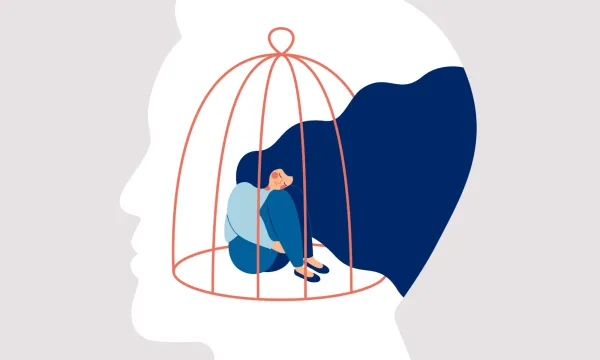Do you have a sneaky feeling that you're married to a narcissist? Here's how you know you're right:
Things to know
- Does your partner frequently laugh at your expense?
- Do they control your actions and your bank account while not allowing you to do the same?
- Do you feel like your needs and desires don't matter to your husband while you bend over backward to make him smile?
If you answered "yes" to most of these questions, then you're probably here because someone told you your husband is probably a narcissist. But what does that even mean? Isn't that just a word people use for a selfish man?
Well, yes, sometimes. However, that doesn't mean that the shoe doesn't fit — especially if you feel like you can't win with your husband.
In this article we're going to explore narcissism as well as some things to look out for that might indicate your husband is a narcissist:
- What Is Narcissism?
- Signs of a Narcissistic Partner
- Can A Narcissistic Spouse Change?
- How To Get Out Of An Abusive Relationship
- Final Thoughts
What Is Narcissism?
The phrase "narcissistic husband" has become a regular part of conversation in recent years, but it is not always used correctly. In fact, some people call anyone who is remotely self-absorbed or lacking in empathy a narcissist.

However, there's a drastic difference between run-of-the-mill selfishness and narcissism.
Narcissism is a trait that exists on a spectrum. Narcissistic individuals are typically characterized by arrogant, self-centered thinking, a severe lack of empathy, and a grandiose view of one's self. These individuals also crave praise and admiration from others and react strongly to even the slightest criticism.
They put their own needs above everyone else's and have a deep need to be right.

If you really think about it, nearly everyone exhibits narcissistic tendencies every once in a while. However, there are several key distinctions that help people understand the difference between a normal level of self-esteem and narcissism.
Narcissistic Personality Disorder Defined
The term "narcissist" comes from Narcissus in Greek mythology. Today, however, "narcissist" refers to a mental disorder known as Narcissistic Personality Disorder (NPD).
Narcissistic personality disorder falls under the Cluster B, or “dramatic cluster,” personality disorders. It is diagnosed by a mental health professional, such as a psychologist or psychiatrist.
According to The Mayo Clinic, people with NPD usually show at least some of these tendencies:
- Exaggerated self-importance
- A sense of entitlement
- A need for constant, excessive admiration
- A need to exaggerate their achievements and talents
- Frequently fantasize about success, power, brilliance, or beauty
- Believe they are superior to everyone else
- Monopolize conversations
- Belittle or look down on people they perceive as inferior
- Expect special favors from everyone
- Expect complete compliance from everyone
- Frequent manipulation of others to get what they want
- An inability to recognize others' needs or feelings
- Extreme envy of others who outshine them
- Extreme arrogance
- A desire to have the best of everything, even if it means putting themselves into debt

In the most basic sense, people with narcissistic personality disorder are viewed as arrogant, power-hungry, and egotistical. In fact, many people with this personality disorder exaggerate personal accomplishments and their own popularity to boast superiority over others.
They may exploit people around them for personal gain. Additionally, these individuals manipulate others with tactics that play on emotions like fear and anger, using threats, lies, and alternative (or fabricated) facts against others.
Narcissistic personality disorder was first recognized as an official diagnosis and appeared in the Diagnostic and Statistical Manual of Mental Disorder’s third edition (DSM-III) in 1980, and it is still a current diagnosis today.
However, many people are quick to throw an NPD label on people just because they seem confident or selfish. This is why it's important to understand the difference between selfishness and narcissism.
Narcissistic Personality Disorder vs. Selfishness
Obviously, we're all a little self-centered at times, and nearly everyone enjoys admiration. So what is the difference between run-of-the-mill selfishness and narcissistic behavior?

Well, most of the time, the difference comes in the form of empathy (or the lack thereof). Even fairly selfish individuals are capable of showing empathy towards others in certain situations. While selfish people do often put their own needs first, they genuinely care about friends in their social circle and usually display empathy fairly frequently. In other words, selfish people are assholes who care.
On the other hand, a narcissistic person completely lacks empathy. Their mental illness keeps from them forming truly healthy relationships, and they only see others as a way to get what they want or need. They don't care about people at all — they only care about what people can help them gain.
A narcissistic relationship is not one that can easily be changed. In fact, people with true narcissistic personality disorder require professional help and extensive interventions to make any sort of progress.

Signs of a Narcissistic Partner
So now that you know what it means to have a narcissistic personality, you're probably wondering if the person you fell in love with could actually be a narcissist or if they're maybe just a bit selfish. Well, most experts agree that these are eight of the most common signs that you're married to a narcissistic husband.
1. They use manipulation to get what they want.
Manipulation is one of the biggest indicators of narcissistic abuse, especially in marital relationships. Most of the time, the relationship starts out fine, and then the narcissist starts slowly dropping hints to indicate that bad things will happen if their needs aren't met or you don't follow their rules.
Over time, the threats may morph into verbal abuse and even become violent or extreme.
In most situations, the victim finds it easier to give in to the demands of their partner than deal with the narcissistic rage that may or may not occur if the victim doesn't "play by the rules."
Unfortunately, this just feeds the narcissist's ego and almost encourages them to continue using their narcissistic traits to get what they want. After all, why stop if it's working?

2. They gaslight you.
Gaslighting is a specific form of manipulation that often occurs in abusive relationships. However, it's often not as easy to spot because the gaslighting person makes the victim question reality and their own memory. Instead, the gaslighting individual downplays the situation or changes the narrative completely to the point where the victim questions their perceptions about everything.
Well, everything except what the abusive partner tells them.
Gaslighting can take many forms. Sometimes the individual will distract the victim to remove the focus from the lie or manipulation. Other times, the gaslighter will discredit the victim by pretending to worry for their mental health, then turn around and say everyone else is the one saying the victim is crazy.
In its most potent form, though, gaslighting simply looks like pathological lying, but done in a way so that the victim doesn't recognize it as emotional abuse.
Over time, the victim may start to feel like the only person they can truly trust is their narcissistic partner. However, this only causes the abuse to continue and their low self-esteem to plummet even more.
3. They constantly put you down.

Unfortunately, the main way a narcissist feeds their own self-esteem is by squashing yours. This means a narcissistic partner will call you names, make jokes at your expense, and outright insult you for their own emotional gain. By making you feel inadequate, they feel better about themselves.
Even in moments when you should be celebrating your own success, narcissistic husbands will find a way to make the situation about themselves. They may say you only achieved a goal because of them, or they may say you accomplished something because you had an unfair advantage over them.
Over time, you will start to internalize these statements and feel even worse about yourself. But this will only feed your partner's ego even more because it makes them look smarter and proves they can control other people.
4. You feel like you must walk on eggshells around them.
If you feel like you can't speak freely around your partner or you have to hide things from them, that's a major red flag in a healthy relationship. However, it can be especially problematic in a narcissistic relationship because it can go from bad to worse at any point.
Unfortunately, most narcissistic partners have very fragile egos. When something doesn't go their way or they don't receive excessive attention to boost their self-esteem, they often resort to verbal abuse (or worse).
Out of fear, most people who live with a narcissistic partner avoid saying or doing anything that may set the partner off, a term which most people refer to as "walking on eggshells."
Conversely, when you're living with someone who may be more of a covert narcissist, they will actually try to make you explode, not the other way around. They will push your buttons until you reach your breaking point, then they will try to say you are the one with a problem.
Unfortunately, even these situations cause the victim to feel like they can't win, which still leaves them walking on eggshells so they can avoid the next conflict.
5. You feel like you don't matter.

When we marry someone, we pledge to love them and offer them emotional support no matter what. However, a narcissistic husband will quickly show his true colors, and you will start to feel like the only person who matters in the relationship is him.
Their constant need to be the best, be right, and get everything they want will quickly overshadow your own needs and desires. If you already have a fragile self-image, this can quickly send you spiraling into a place where you feel unlovable, and it seems like you don't really matter to anyone — especially your spouse.
Unfortunately, this causes victims to lose themselves in the relationship. They will do anything and everything to keep their partner happy without even realizing that they've started casting off their own needs for the sake of a relationship that makes them feel worthless and powerless.
It can very quickly become a slippery slope before you even realize what's happening.
6. You frequently get "the silent treatment" from your husband.

Many of us remember the silent treatment from our childhood. However, it's rarely something grown adults use on a daily basis. Well, unless they are a narcissistic person that is.
Unfortunately, a narcissistic husband will use this tactic as a form of manipulation. He will turn off all communication and essentially stonewall you. He may also withhold affection and even pretend like you don't exist until you give in to his demands. It's almost like a power struggle, but the narcissistic person is always the one with the upper hand.
You may not see this as something that happens in troubled relationships, especially if you are used to physical abuse being the only form of abuse you recognize. However, you need to realize that this type of behavior is definitely not normal or part of a healthy relationship.
Married couples rarely use the silent treatment, and even if they do, it is not something that occurs frequently at all. Instead, most partners use conflict resolution and open communication to discuss what's bothering them.
7. They never take responsibility for their actions (and blame you instead).

Because individuals with narcissistic traits often have an inflated perspective of themselves, they rarely recognize their own faults (and they never admit them). Instead, they typically look for ways to reframe the situation and place blame on someone else.
For example, if they show up late to a dinner date, they may say that you sent the wrong time or didn't get the restaurant address correct. Or, if they say something offensive, they will respond with things like "it's a joke!" or "why are you always so sensitive?"
It doesn't matter what the facts show, they will always find a way to place that blame onto you and wear down your self-esteem even more.
8. You can't win.
Last, but certainly not least, there's no winning with an individual with narcissistic tendencies, no matter how hard you try. They will find a way to pick apart everything you say and do, and they certainly will have plenty to say about what you wear and how you spend your time.
In a narcissist's mind, they have the right to say even the most hurtful things to you because they see your actions as a disappointment to them, not a reflection on you. Their lack of empathy makes it impossible for them to care about how you feel, which only makes their comments sting even more.
Therefore, if your partner constantly criticizes you for everything you do, or they become angry even when you follow all of their demands, that's a huge red flag that something isn't right with them or the relationship.
Can A Narcissistic Spouse Change?

Regardless of all the flaws listed above, chances are you still love your partner, even if they are a narcissistic person. So, you may be asking yourself: can my husband change? Can I help him become a more empathetic, kind-hearted person?
After all, most people can change, so it's not unreasonable for you to want that for the person you committed your life to. So what's the issue?
Well, the issue is that it's hard. In most cases, people with a narcissistic personality weren't born that way — they adopted these habits as a way to protect themselves from vulnerability and other painful experiences.
As is the case with any other personality disorder, these behaviors become so deeply rooted that they are essentially part of the very essence of who they are as a person, much like people with substance use issues.
Furthermore, these narcissistic tendencies they adopted often push away their social circle, leaving them with little to no support system there to encourage change. Since support systems are a critical component of any type of recovery journey or mental health treatment, this can add another layer of difficulty to an already problematic situation.
All that being said, it is possible for narcissistic husbands to change, but only if they want to and if they're willing to get professional help to do so.
Signs A Narcissistic Husband Wants To Change

Unfortunately, not everyone who exhibits narcissistic behavior wants to change. In many cases, they either don't see a reason to change, or they've convinced themselves that using these specific behaviors is the only way to make it in the world. This can be difficult to overcome, especially if your spouse has used these traits for a long time.
However, if you suspect your partner may be open to working on themselves, look for these signs that your spouse does want to change:
- They start taking accountability for their actions.
- They try to regulate their emotions and avoid outbursts.
- They willingly accept feedback on their behavior.
- They continue to show consistent efforts towards change.
Treatment Options For Individuals With Narcissistic Traits
While there's no "one size fits all" approach to treatment for any mental condition, there are several proven types of therapy that work for individuals with this specific mental disorder. These modalities include schema therapy, transference-focused therapy, and metacognitive interpersonal therapy (MIT).
While different, each of these therapies can help address the behavior patterns your narcissistic spouse may live with.
For example, schema therapy helps identify unhelpful thought and behavior patterns so the individual can work on changing these patterns. Similarly, transference-focused therapy helps people practice behavior changes directly with their therapist, which can be harder for people to do with their friends or family.
The key to any treatment success is finding a therapist equipped to deal with the problem at hand, meaning you need to share with them from the beginning so they realize what needs to be addressed.

How To Get Out Of An Abusive Relationship
Unfortunately, not all narcissistic individuals are ready or willing to get help. However, this doesn't mean you have to stay in an abusive relationship just because your partner isn't willing to do the work. In fact, you have every right to leave an unhealthy marriage at any time for your own mental health and safety.
First and foremost, you can use your own support system to get help. This may mean you need to tell friends or family members about what's going on and how you are feeling about the relationship. Chances are, these individuals are already aware of the red flags your spouse displays, and they will be more than willing to help you plan how to leave.
In fact, they may even be willing to give you a temporary place to stay or help you out in some other way, especially if your narcissistic husband also uses financial abuse to keep you with him.
If you're worried your partner will pick up on your plans, use a friend's phone or buy a burner phone to use while you set your plans in motion. In many cases, it's important to lay out all of your plans so that you can quickly escape when the time is right, especially if your spouse is prone to narcissistic rage or other types of violent outbursts.
Most importantly, you can keep yourself safe and work through the separation process by hiring legal representation to help you navigate divorce and other concerns. You may even need to obtain a restraining order or similar types of documents to avoid further stalking or other forms of abuse from your husband or, eventually, ex-husband.

If you don't have much in the way of support, there are organizations ready and willing to help you as well. For example, the National Domestic Violence Hotline can be a great source of support and help, especially in the early stages of your escape.
Final Thoughts
Although modern society throws around the term "narcissist" like it's a new fashion item, you can easily identify the difference between a slightly self-absorbed person and a true narcissist.
By knowing the signs and understanding what's going on inside the mind of someone with this disorder, you can more easily decide if you can help them or if you should just walk away.
Remember that nobody ever deserves what happens in an abusive relationship. If you feel like your husband is treating you in a way that isn't healthy, then you have options. Remember your rights, and don't be afraid to leave if it's what you truly need. Your health and happiness are more important than any relationship.
You may love your narcissistic husband, but chances are he doesn't truly love you. If you feel like there's no hope, then put yourself first. It's one of the most important things you can ever do for yourself, and your friends and family will support you in these endeavors because they want to see you happy.









